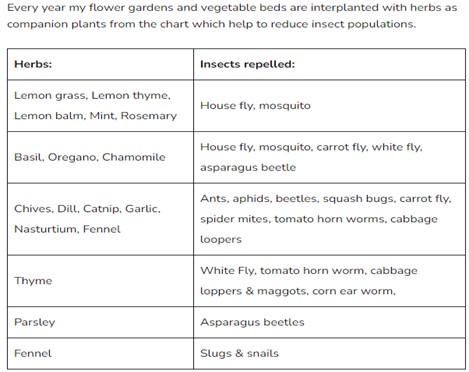It’s no secret; the verdict is in: soil, seeds and plants treated with neonicotinoid, insecticides or herbicide is detrimental to pollinators, wildlife and yes to our own health. Pesticides, insecticides and Herbicides are responsible for altering soil health by removing fungicides and micro-organism that contribute to healthy soil. The toxic chemicals travel thru the plants and flowers finally being consumed by and killing foraging pollinators and honey bees including Bees in the hive. Consider to avoid these toxins noting that pets, visiting wildlife, and neighbors can also experience an allergic reaction. These toxins infiltrate our surface run off water, travel by air and their host spreading to neighboring sites.
There are options utilizing organic natural pest control methods.
- Selecting cultivars with resistance or tolerance to target pests
- Maintaining healthy and vigorous plants with good nutrient and moisture management
- Promoting good air circulation within the garden to promote drying of the plants
- Rouging or removing plants that are diseased
- Using crop rotations to avoid the buildup of pests
- Creating habitats for beneficial insects
Herbs and Spice plants partnerships are a great place to start to naturally repel pesky garden pests by planting Marigold, Nasturtiums, Peppermint, Oregano. The essence of these plants actually repels pests that can damage fruit and vegetable gardens. Adversely Honey Bees and pollinators love to pollinate and collect the nectar from these plants.
Create a watering trough with nutrient rich supplements for pollinators. During a dearth Beekeepers supplement Honey Bees with 1:1 or 2:1 sugar water or place pollen patties inside the hive. If you do not own or lease a hive on your property there are many options to help keep Honey Bees hydrated. Consider a sponge or cotton cloth material soaked in water a Pollinator watering trough just as you would for your Humming Birds or wild birds that visit your pollinator garden. Just like Humming Birds like their sweet water so do Honey Bees. Create a “Bee Tea” feed collecting herbal leaves the Bees love to visit and add 2:1 sugar water ratio. Just a note of caution: there is a risk to attracting the more aggressive pollinators such as wasps and
Consider reaching out to your local community or Jurisdiction for a community garden. The benefits are tremendous by strengthening community ties, teaching gardening skills, enjoying the colorful visual display of color variations, observing the relationship with plant, pollinators and insect life.
Follow up with a Master Gardener at your local center. Research horticulture and agricultural papers. Additional resources are listed in the Resource section below. Of course, reach out to your local Beekeeper for additional assistance. Through all of this effort you have supported a thriving eco system and saved the Honey Bee!!!
How can we support Honey Bee Nutrition:
- https://extension.psu.edu/growing-an-organic-garden-the-fundamentals
- https://pollinator.org/guides
- https://xerces.org/pollinator-resource-center/pnw
- https://www.xerces.org/blog/8-pesticide-myths-every-gardener-should-know
- https://thewoodlandstownshipblog-environment.com/2023/06/16/sow-your-love-for-pollinators/
- https://www.snopes.com/fact-check/bees-dandelions-food/
- https://www.thecooldown.com/green-home/nasturtium-plant-pests-garden-advice/
Additional Resources:
- https://planthardiness.ars.usda.gov/
- https://planthardiness.ars.usda.gov/pages/map-downloads
- https://xerces.org/pollinator-resource-center
- https://phys.org/news/2023-03-bigger-greater-rewards-climate-disruptions.html
- https://leasehoney.com/2020/11/24/how-soil-health-affects-bees/
- https://blog.jungseed.com/a-gardeners-guide-to-plant-nutrition/
- https://snohomishcd.org/blog/2022/12/29/practice-highlight-food-forests
- https://harvestsavvy.com/sustainable-gardening-through-ecosystem-design/?fbclid=IwAR218tZb8OHEU-fuUcCYXUTxpFqPYwwXPbgIE8iKYHqKNQBNtcr1mo1cPLk
- https://www.beeandbutterflyfund.org/uploads/1/3/3/3/133320811/polinator_habitat_guide_-_2021.pdf
- https://www.beeandbutterflyfund.org/

